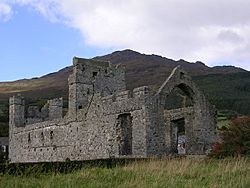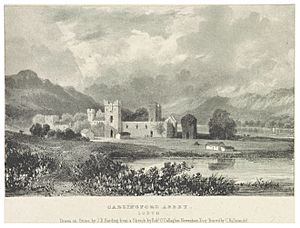Carlingford Abbey facts for kids
| Mainistir Chairlinn | |
 |
|
| Monastery information | |
|---|---|
| Other names | Carlingford Friary/Priory |
| Order | Dominican Order (Order of Preachers) |
| Established | 1305 |
| Disestablished | 1777 |
| Diocese | Armagh |
| People | |
| Founder(s) | Richard Óg de Burgh, 2nd Earl of Ulster |
| Architecture | |
| Status | Inactive |
| Style | Norman |
| Site | |
| Location | Abbey Court, Carlingford, County Louth |
| Coordinates | 54°02′17″N 6°11′04″W / 54.038148°N 6.184459°W |
| Visible remains | nave, chancel, bell-tower, domestic buildings, mill |
| Public access | yes |
| Official name | Carlingford Abbey |
| Reference no. | 623 |
Carlingford Abbey, also known as Carlingford Friary or Carlingford Priory, is a very old building in Carlingford, County Louth, Ireland. It was once a home for Dominican monks, who are part of a Christian religious group. Today, it is a National Monument, which means it's a protected historical site.
Where is Carlingford Abbey?
You can find Carlingford Abbey right in the middle of Carlingford town. It's easy to spot, just off Dundalk Street.
A Look at Its History
Carlingford Abbey was started around the year 1305. It was built for the Dominican monks with help from a powerful person named Richard Óg de Burgh, 2nd Earl of Ulster. The abbey was dedicated to Saint Malachy, an important Irish saint.
Over the years, the abbey changed. In 1423, two strong towers were added to the church. These towers made the building look more like a fortress, helping to protect it. More building work happened in the early 1500s.
The abbey was used by the monks for a long time. However, during a period called the Dissolution of the Monasteries, many religious buildings in Ireland were closed down. Carlingford Abbey was one of them. After it closed, the buildings were used for different things, like a large hall, a place for soldiers, and even a court for playing handball.
In 1671, during the time of King Charles II, there was a plan to reopen the abbey. But there was a disagreement about who should own it. Oliver Plunkett, who was a Catholic Archbishop, made sure the Dominicans got their abbey back. However, the monks eventually moved their main base to Dundalk in 1777.
What You Can See Today
When you visit Carlingford Abbey, you can still see parts of the old church. These include the main hall, called the nave, the area near the altar, known as the chancel, and the tall central bell-tower. These parts are made from strong local stones like limestone.
A little to the south of the main church, you can also find other old buildings and a mill house. These were likely used for daily life and work at the abbey.
In the 1400s, special defensive features were added to the abbey. These included battlements (the notched tops of walls) and a machicolation, which was a projecting structure with openings to drop things on attackers. These additions show how important it was to protect the abbey in those times.
 | William L. Dawson |
 | W. E. B. Du Bois |
 | Harry Belafonte |



